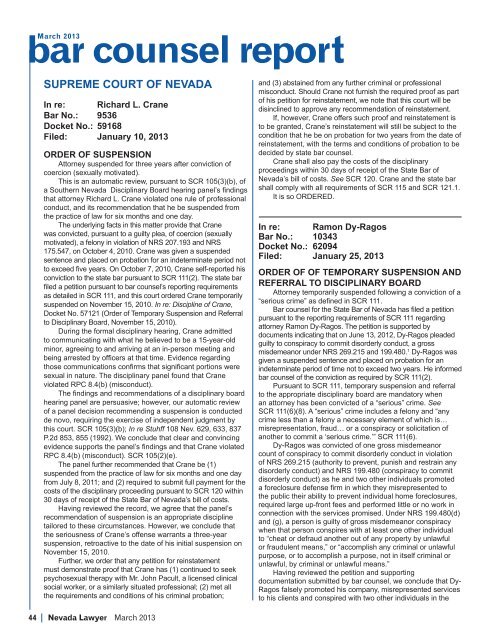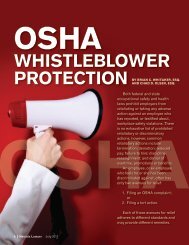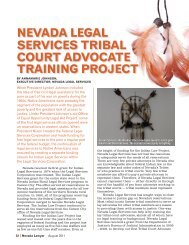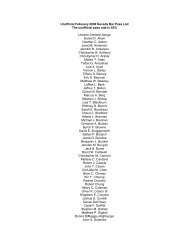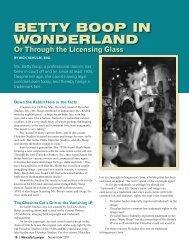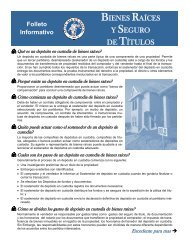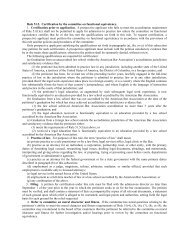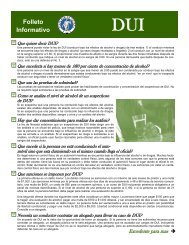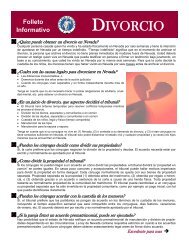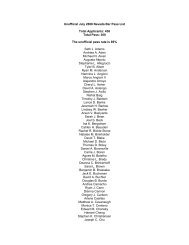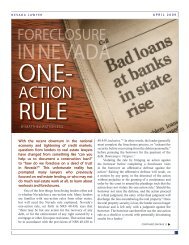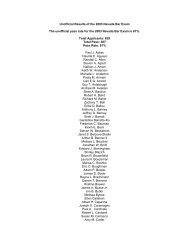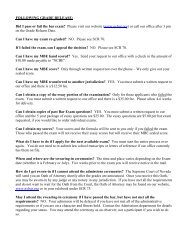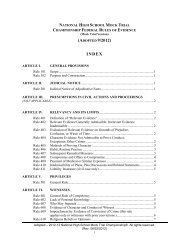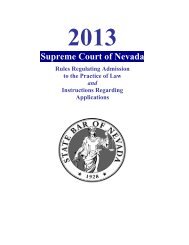bar counsel report - State Bar Of Nevada
bar counsel report - State Bar Of Nevada
bar counsel report - State Bar Of Nevada
Create successful ePaper yourself
Turn your PDF publications into a flip-book with our unique Google optimized e-Paper software.
ar<br />
March 2013<br />
<strong>counsel</strong> <strong>report</strong><br />
SUPREME COURT OF NEVADA<br />
In re: Richard L. Crane<br />
<strong>Bar</strong> No.: 9536<br />
Docket No.: 59168<br />
Filed: January 10, 2013<br />
ORDER OF SUSPENSION<br />
Attorney suspended for three years after conviction of<br />
coercion (sexually motivated).<br />
This is an automatic review, pursuant to SCR 105(3)(b), of<br />
a Southern <strong>Nevada</strong> Disciplinary Board hearing panel’s fi ndings<br />
that attorney Richard L. Crane violated one rule of professional<br />
conduct, and its recommendation that he be suspended from<br />
the practice of law for six months and one day.<br />
The underlying facts in this matter provide that Crane<br />
was convicted, pursuant to a guilty plea, of coercion (sexually<br />
motivated), a felony in violation of NRS 207.193 and NRS<br />
175.547, on October 4, 2010. Crane was given a suspended<br />
sentence and placed on probation for an indeterminate period not<br />
to exceed fi ve years. On October 7, 2010, Crane self-<strong>report</strong>ed his<br />
conviction to the state <strong>bar</strong> pursuant to SCR 111(2). The state <strong>bar</strong><br />
fi led a petition pursuant to <strong>bar</strong> <strong>counsel</strong>’s <strong>report</strong>ing requirements<br />
as detailed in SCR 111, and this court ordered Crane temporarily<br />
suspended on November 15, 2010. In re: Discipline of Crane,<br />
Docket No. 57121 (Order of Temporary Suspension and Referral<br />
to Disciplinary Board, November 15, 2010).<br />
During the formal disciplinary hearing, Crane admitted<br />
to communicating with what he believed to be a 15-year-old<br />
minor, agreeing to and arriving at an in-person meeting and<br />
being arrested by offi cers at that time. Evidence regarding<br />
those communications confi rms that signifi cant portions were<br />
sexual in nature. The disciplinary panel found that Crane<br />
violated RPC 8.4(b) (misconduct).<br />
The fi ndings and recommendations of a disciplinary board<br />
hearing panel are persuasive; however, our automatic review<br />
of a panel decision recommending a suspension is conducted<br />
de novo, requiring the exercise of independent judgment by<br />
this court. SCR 105(3)(b); In re Stuhff 108 Nev. 629, 633, 837<br />
P.2d 853, 855 (1992). We conclude that clear and convincing<br />
evidence supports the panel’s fi ndings and that Crane violated<br />
RPC 8.4(b) (misconduct). SCR 105(2)(e).<br />
The panel further recommended that Crane be (1)<br />
suspended from the practice of law for six months and one day<br />
from July 8, 2011; and (2) required to submit full payment for the<br />
costs of the disciplinary proceeding pursuant to SCR 120 within<br />
30 days of receipt of the <strong>State</strong> <strong>Bar</strong> of <strong>Nevada</strong>’s bill of costs.<br />
Having reviewed the record, we agree that the panel’s<br />
recommendation of suspension is an appropriate discipline<br />
tailored to these circumstances. However, we conclude that<br />
the seriousness of Crane’s offense warrants a three-year<br />
suspension, retroactive to the date of his initial suspension on<br />
November 15, 2010.<br />
Further, we order that any petition for reinstatement<br />
must demonstrate proof that Crane has (1) continued to seek<br />
psychosexual therapy with Mr. John Pacult, a licensed clinical<br />
social worker, or a similarly situated professional; (2) met all<br />
the requirements and conditions of his criminal probation;<br />
44 <strong>Nevada</strong> Lawyer March 2013<br />
and (3) abstained from any further criminal or professional<br />
misconduct. Should Crane not furnish the required proof as part<br />
of his petition for reinstatement, we note that this court will be<br />
disinclined to approve any recommendation of reinstatement.<br />
If, however, Crane offers such proof and reinstatement is<br />
to be granted, Crane’s reinstatement will still be subject to the<br />
condition that he be on probation for two years from the date of<br />
reinstatement, with the terms and conditions of probation to be<br />
decided by state <strong>bar</strong> <strong>counsel</strong>.<br />
Crane shall also pay the costs of the disciplinary<br />
proceedings within 30 days of receipt of the <strong>State</strong> <strong>Bar</strong> of<br />
<strong>Nevada</strong>’s bill of costs. See SCR 120. Crane and the state <strong>bar</strong><br />
shall comply with all requirements of SCR 115 and SCR 121.1.<br />
It is so ORDERED.<br />
In re: Ramon Dy-Ragos<br />
<strong>Bar</strong> No.: 10343<br />
Docket No.: 62094<br />
Filed: January 25, 2013<br />
ORDER OF OF TEMPORARY SUSPENSION AND<br />
REFERRAL TO DISCIPLINARY BOARD<br />
Attorney temporarily suspended following a conviction of a<br />
“serious crime” as defi ned in SCR 111.<br />
<strong>Bar</strong> <strong>counsel</strong> for the <strong>State</strong> <strong>Bar</strong> of <strong>Nevada</strong> has fi led a petition<br />
pursuant to the <strong>report</strong>ing requirements of SCR 111 regarding<br />
attorney Ramon Dy-Ragos. The petition is supported by<br />
documents indicating that on June 13, 2012, Dy-Ragos pleaded<br />
guilty to conspiracy to commit disorderly conduct, a gross<br />
misdemeanor under NRS 269.215 and 199.480. 1 Dy-Ragos was<br />
given a suspended sentence and placed on probation for an<br />
indeterminate period of time not to exceed two years. He informed<br />
<strong>bar</strong> <strong>counsel</strong> of the conviction as required by SCR 111(2).<br />
Pursuant to SCR 111, temporary suspension and referral<br />
to the appropriate disciplinary board are mandatory when<br />
an attorney has been convicted of a “serious” crime. See<br />
SCR 111(6)(8). A “serious” crime includes a felony and “any<br />
crime less than a felony a necessary element of which is…<br />
misrepresentation, fraud… or a conspiracy or solicitation of<br />
another to commit a ‘serious crime.’” SCR 111(6).<br />
Dy-Ragos was convicted of one gross misdemeanor<br />
count of conspiracy to commit disorderly conduct in violation<br />
of NRS 269.215 (authority to prevent, punish and restrain any<br />
disorderly conduct) and NRS 199.480 (conspiracy to commit<br />
disorderly conduct) as he and two other individuals promoted<br />
a foreclosure defense fi rm in which they misrepresented to<br />
the public their ability to prevent individual home foreclosures,<br />
required large up-front fees and performed little or no work in<br />
connection with the services promised. Under NRS 199.480(d)<br />
and (g), a person is guilty of gross misdemeanor conspiracy<br />
when that person conspires with at least one other individual<br />
to “cheat or defraud another out of any property by unlawful<br />
or fraudulent means,” or “accomplish any criminal or unlawful<br />
purpose, or to accomplish a purpose, not in itself criminal or<br />
unlawful, by criminal or unlawful means.”<br />
Having reviewed the petition and supporting<br />
documentation submitted by <strong>bar</strong> <strong>counsel</strong>, we conclude that Dy-<br />
Ragos falsely promoted his company, misrepresented services<br />
to his clients and conspired with two other individuals in the
commission of this misconduct. This constitutes a serious<br />
crime as defi ned under SCR 111(6).<br />
Accordingly, we temporarily suspend Dy-Ragos from<br />
the practice of law in <strong>Nevada</strong> and refer this matter to the<br />
Southern <strong>Nevada</strong> Disciplinary Board for the initiation of<br />
formal disciplinary proceedings in which the sole issue to be<br />
determined shall be the extent of the discipline to be imposed.<br />
SCR 111(7), (8).<br />
It is so ORDERED.<br />
In re: Vincent Savarese, III<br />
<strong>Bar</strong> No.: 2467<br />
Docket No.: 62046<br />
Filed: January 10, 2013<br />
ORDER REINSTATING ATTORNEY<br />
TO ACTIVE STATUS<br />
Attorney reinstated with conditions from disability inactive status.<br />
This is a petition under SCR 117 for reinstatement from<br />
disability inactive status by attorney Vincent Savarese, III.<br />
In March 1994, this court transferred Savarese to disability<br />
inactive status. 2 See In re: Disability of Vincent Savarese, III,<br />
Docket No, 25379 (Order of Transfer to Disability Inactive<br />
Status, March 14, 1994). A hearing regarding reinstatement<br />
was held before a panel of the Southern <strong>Nevada</strong> Disciplinary<br />
Board. The record of the hearing panel’s proceedings has been<br />
fi led with this court. 3<br />
The hearing panel found that Savarese demonstrated<br />
by clear and convincing evidence that his disability has been<br />
removed and that he is fi t to resume the practice of law.<br />
See SCR 117(4), (5). The hearing panel recommended that<br />
Savarese be reinstated to practice law and that he attend<br />
meetings of Lawyers Concerned for Lawyers twice a month for<br />
the fi rst year of his reinstatement.<br />
Having reviewed the record, we conclude that clear<br />
and convincing evidence supports the panel’s fi ndings that<br />
Savarese’s disability has been removed, and that he is fi t to<br />
resume the practice of law. See SCR 117(4), (5). We further<br />
approve the recommendation that Savarese attend two<br />
meetings of the Lawyers Concerned for Lawyers every month<br />
for the fi rst year of his reinstatement. He shall pay the costs<br />
of the reinstatement proceedings within 30 days of the date of<br />
this order. We further direct that any disciplinary proceedings<br />
against Savarese may resume. See SCR 117(4).<br />
NORTHERN NEVADA<br />
DISCIPLINARY BOARD<br />
PUBLIC REPRIMAND<br />
In re: Rodney Sumpter, Esq.<br />
<strong>Bar</strong> No.: 899<br />
File No.: N10-20-332<br />
Filed: October 10, 2012<br />
Public Reprimand imposed for failure to obtain a written<br />
disclosure or agreement before entering into a business<br />
<strong>bar</strong> <strong>counsel</strong> <strong>report</strong><br />
March 2013<br />
transaction with a client, charging an unreasonable fee to<br />
client, and charging client for defending the state <strong>bar</strong> action.<br />
TO: RODNEY SUMPTER ESQ.<br />
Your client (Client) was experiencing fi nancial hardships,<br />
including the foreclosure on his home. You claim that the<br />
various real estate transactions involving Client came about in<br />
the following manner:<br />
Client inherited two properties from a long-time partner,<br />
who died while the two gentlemen were residing in Canada.<br />
Client wished to further develop the properties and secured<br />
fi nancing from some private investors; these private investors<br />
were placed on the deeds to the properties on March 2,<br />
2007. The investors eventually failed to make the mortgage<br />
payments, sending the property into foreclosure.<br />
After the private investors were placed on the deed,<br />
they borrowed against the property’s equity and paid Client a<br />
portion of the proceeds. Client then placed $20,000 in a trust<br />
account with your offi ce, intending the money to be used for<br />
future land development and associated fees. When the bank<br />
foreclosed on the property, Client, then faced with eviction,<br />
approached you asking if he could use your credit to purchase<br />
the property back from the bank.<br />
On August 8, 2008, two deeds and corresponding deeds<br />
of trust were recorded, placing you exclusively on the titles<br />
of both your residence and the adjoining property. In order to<br />
satisfy your ability to assume the obligation, Client advised you<br />
that he had secured a third person of appropriate age to obtain<br />
a reverse mortgage so that, after the property was reacquired,<br />
the reverse mortgage would be put in place. You were to take<br />
out a loan which would then be satisfi ed by the proceeds from<br />
the reverse mortgage.<br />
Because the reverse mortgage required the elderly person<br />
to be on the title of her residence, you caused her name to be<br />
added to the deed on January 16, 2009. As a condition, you<br />
requested a deed to re-convey the property in the event of a<br />
default or a failure to perform.<br />
The transaction involved you obtaining a loan, which you<br />
did for $90,000, secured by the two properties. On August 8,<br />
2008, the transaction was consummated through an escrow<br />
account at Ticor Title and your offi ce paid closing costs from<br />
the monies held in trust for Client at his request.<br />
Client then asked you to prepare a deed in which the<br />
elderly person would appear as a joint tenant for her property.<br />
This was accomplished on January 16, 2009; however, they<br />
were unable to secure the reverse mortgage that was the<br />
motivation for all of the real estate transactions.<br />
The $90,000 loan that you obtained for the benefi t of<br />
Client was to be paid off by August 8, 2009, with the proceeds<br />
from the reverse mortgage that was never obtained. A one-year<br />
extension (a copy of which was included with grievance) was<br />
granted by the lender for $90,975.<br />
Client provided several responses requesting that the <strong>bar</strong><br />
demand you relinquish the properties to them and replenish the<br />
$20,000 in trust money. Client maintains that you were never<br />
instructed to take legal fees out of the trust money and should<br />
have held that money for your client’s future rental/mortgage<br />
payments and living expenses.<br />
continued on page 46<br />
March 2013 <strong>Nevada</strong> Lawyer 45
ar<br />
March 2013<br />
<strong>counsel</strong> <strong>report</strong><br />
You paid your law fi rm from the trust account for legal<br />
fees and costs which were incurred as a result of the<br />
various real estate transactions including fees to defend the<br />
instant <strong>bar</strong> complaint.<br />
Rule of Professional Conduct (RPC) 1.8(a) provides:<br />
A lawyer shall not enter into a business transaction with a<br />
client or knowingly acquire an ownership, possessory, security<br />
or other pecuniary interest adverse to a client unless:<br />
1. The transaction and terms on which the lawyer<br />
acquires the interest are fair and reasonable to<br />
the client and are fully disclosed and transmitted<br />
in writing in a manner that can be reasonably<br />
understood by the client;<br />
2. The client is advised in writing of the desirability of<br />
seeking and is given a reasonable opportunity to<br />
seek the advice of independent legal <strong>counsel</strong> on<br />
the transaction; and<br />
3. The client gives informed consent, in a writing<br />
signed by the client, to the essential terms of the<br />
transaction and the lawyer’s role in the transaction,<br />
including whether the lawyer is representing the<br />
client in the transaction.<br />
You violated this rule, as there were no written<br />
disclosures or agreements with Client satisfying any of the<br />
requirements in RPC 1.8. You further violated RPC 1.5<br />
by charging an unreasonable fee, by failing to account to<br />
Client for the fees charged and for billing Client for fees you<br />
incurred in defending the state <strong>bar</strong> action.<br />
In light of the forgoing, you have violated Rule of<br />
Professional Conduct (RPC) 1.8 (a) (Confl ict of Interest:<br />
Current Clients; Specifi c Rules) and RPC 1.5 (b) (Fees).<br />
SOUTHERN NEVADA<br />
DISCIPLINARY BOARD<br />
PUBLIC REPRIMAND<br />
In re: Xin Q. Wang, Esq.<br />
<strong>Bar</strong> No.: New York <strong>Bar</strong> No. 4157079<br />
File No.: SG10-0820<br />
Filed: September 12, 2012<br />
Public Reprimand imposed on New York lawyer for<br />
engaging in unauthorized practice of law in the <strong>State</strong> of<br />
<strong>Nevada</strong>.<br />
TO: XIN Q. WANG ESQ.<br />
You are a licensed attorney in the state of New York.<br />
You maintain offi ces in <strong>Nevada</strong> and practice Immigration<br />
law and handle federal matters. At no time have you ever<br />
been licensed to practice law in the state of <strong>Nevada</strong> or<br />
authorized to practice or appear in any court, pursuant to<br />
<strong>Nevada</strong> Supreme Court Rules.<br />
On September 23 and 24, 2010, you wrote two<br />
separate letters of representation to an Insurance adjuster<br />
46 <strong>Nevada</strong> Lawyer March 2013<br />
for two unrelated claimants involved in vehicle accidents with<br />
one of company’s insured drivers. Both letters provided, as<br />
follows:<br />
Please be advised that this offi ce represents our client .<br />
. . for personal injuries and property damage arising from the<br />
collision. This offi ce has a lien on our client’s cause of action and<br />
any recoveries thereunder. Please include our name, Zhengyi<br />
Law Group, Ltd., as payee on any and all settlement drafts and<br />
advances, whether or not this offi ce still represents our client at<br />
the time of settlement or resolution of the subject claim.<br />
Please provide written confi rmation of coverage to this<br />
offi ce at your earliest convenience<br />
If you have any questions please do not hesitate to contact me.<br />
Very Truly Yours<br />
/s/<br />
Xin Wang, Esq.<br />
Such conduct constitutes the unauthorized practice of law.<br />
See, In re Discipline of Lerner 124 Nev. 1232, 1241-2, 197 P.3d<br />
1067 (2003) (Practice of law includes decision to represent a<br />
particular client, negotiating claims with insurance companies,<br />
speaking on clients’ behalf and preparing and signing demand<br />
letters); In re: Jackman, 761 A2d 1103 (NJ. 2000) (Non-licensed<br />
attorney engaged in practice of law when he interviewed and<br />
<strong>counsel</strong>ed clients, prepared and signed documents to or on<br />
behalf of clients, and negotiated with lawyers).<br />
The hearing panel found in aggravation the fact that you<br />
have been previously disciplined for the same rule violation.<br />
The panel considered in mitigation the facts that the second<br />
discipline sanction was issued shortly after you wrote the letters<br />
above. In addition, the panel noted that you have acknowledged<br />
the error of your conduct, have cooperated in the disciplinary<br />
proceedings and have instituted changes in your law practice to<br />
ensure that such conduct is not repeated.<br />
Based upon the foregoing, you are hereby PUBLICLY<br />
REPRIMANDED for violation of Rule of Professional Conduct<br />
5.5 (Unauthorized practice of law).<br />
PUBLIC REPRIMAND<br />
In re: Kurt D. Elkins, Esq.<br />
<strong>Bar</strong> No.: California <strong>Bar</strong> No. 241562<br />
File No.: SG10-0060<br />
Filed: January 23, 2013<br />
Public Reprimand imposed on California lawyer for making<br />
a false statement of material fact to the <strong>State</strong> <strong>Bar</strong> of <strong>Nevada</strong><br />
regarding representation of a <strong>Nevada</strong> client.<br />
TO: KURT D. ELKINS, ESQ.<br />
California attorney Paul J. Molinaro fi led a grievance<br />
with the <strong>State</strong> <strong>Bar</strong> of <strong>Nevada</strong> in January 2010, against you,<br />
in connection with a loan modifi cation concerning his client<br />
(Client), of Las Vegas, <strong>Nevada</strong>.<br />
Client retained Greenleaf Modify, Inc. d/b/a U.S.<br />
Homeowners’ Relief (Greenleaf) to assist him in obtaining a loan<br />
modifi cation. Client was told by Greenleaf employees that you
would be the attorney representing Client in his efforts to<br />
obtain a modifi cation.<br />
Molinaro provided records to support his assertions<br />
including an Engagement Agreement between Client<br />
and Greenleaf, evidence of payments to Greenleaf in the<br />
amount of $4,250, an invoice from US. Homeowners Relief<br />
to the Client and correspondence he forwarded to U.S.<br />
Homeowners Relief, demanding the return of the funds paid.<br />
Molinaro also produced a copy of a letter dated<br />
February 5, 2009, sent, on your letterhead with your<br />
signature, to Countrywide Home Loans, regarding Client’s<br />
<strong>Nevada</strong> property. The letter stated that your “investigations<br />
have revealed several potential violations of law, including,<br />
among others, common law fraud and constructive fraud,<br />
in violation of the Real Estate Settlement Procedures Act<br />
(RESPA).” The letter went on to state that “it is clear that<br />
the broker breached his fi duciary duty to the lender” and<br />
suggested a modifi cation of the terms of the existing loan<br />
and asked that Countrywide contact your offi ce to discuss<br />
this matter in detail.<br />
Client did not receive a loan modifi cation and his efforts at<br />
obtaining a refund were refused. In January of 2010, Molinaro<br />
contacted you on behalf of Client regarding the failure to<br />
secure a loan modifi cation for Client’s <strong>Nevada</strong> property. You<br />
told Molinaro that you never represented Client.<br />
On or about June 2010, <strong>Bar</strong> Counsel sent correspondence<br />
to your attention, asking for an explanation of this matter.<br />
You sent a letter in response stating that you had never<br />
represented Client, that your identity was stolen, your<br />
signature was forged and that you had made a police <strong>report</strong><br />
on the identify theft.<br />
<strong>Bar</strong> Counsel obtained a copy of the police <strong>report</strong>,<br />
which did allege that Greenleaf had improperly used your<br />
identity. However, the police <strong>report</strong> also confi rmed that you<br />
did perform work for U.S. Homeowners’ Relief from January<br />
to April 2009. This was the period during which the letter in<br />
question was drafted.<br />
The February 5, 2009, letter to Countrywide Home Loans<br />
regarding Client was sent via facsimile. The facsimile line on<br />
the letter notates it was sent from Power Brokers (714) 279-<br />
0011 on February 13, 2009, at 5:21, a company you formed.<br />
In subsequent communications following the fi ling of<br />
the complaint, you stated that you had been doing general<br />
<strong>counsel</strong> work for a few modifi cation companies, including<br />
Greenleaf. You stated that when you responded to the state<br />
<strong>bar</strong>, you had confused the timeline for your association<br />
with Greenleaf and conceded that the letter in question<br />
was issued by your offi ce as part of your representation of<br />
Greenleaf.<br />
You confi rmed that no fee agreement had been entered<br />
into between your law fi rm and Elder, no funds had been<br />
paid by Elder to your law fi rm and that you had never met<br />
with or spoken to Elder.<br />
You stated that you were not aware that Greenleaf<br />
employees were using your law fi rm name in their<br />
advertising materials or misrepresenting to their customers<br />
that you were their retained <strong>counsel</strong>. You stated that<br />
you examined fi les and prepared letters as requested by<br />
Greenleaf and had no contact with any of the customers of<br />
Greenleaf directly.<br />
<strong>bar</strong> <strong>counsel</strong> <strong>report</strong><br />
March 2013<br />
In light of the foregoing, you violated Rule of Professional<br />
Conduct 1.3 (Diligence) and RPC 8.1(a) (<strong>Bar</strong> Admission<br />
and Disciplinary Matters) and are hereby PUBLICLY<br />
REPRIMANDED.<br />
1. For purposes of SCR 111, Dy-Ragos’s guilty plea qualifi es as a<br />
“conviction” regardless of whether or not he has received a signed<br />
judgment of conviction. See SCR 111(1).<br />
2. SCR 117 became effective on February 15, 1979, and has been<br />
amended and the subsections renumbered since that time. The<br />
amendments do not change the substance of our analysis; for<br />
clarity, the citations in the text are to the current SCR 117.<br />
3. A medical assessment dated May 3, 2012, and a lab <strong>report</strong> dated<br />
April 16, 2012, were fi led under seal.<br />
DISCIPLINE KEY<br />
Resignation with charges pending: SCR 98(5)(b)<br />
Types of possible discipline listed generally: SCR 102<br />
Attorneys convicted of crimes: SCR 111<br />
Conditional guilty plea agreements<br />
(discipline by consent): SCR 113<br />
Reciprocal discipline: SCR 114<br />
Dis<strong>bar</strong>red/Suspended attorneys: SCR 115<br />
Reinstatement: SCR 116<br />
Disability Inactive: SCR 117<br />
Supreme Court Rules (SCRs):<br />
www.leg.state.nv.us/CourtRules/SCR.html<br />
DISBARMENT – License to practice revoked.<br />
SUSPENSION – License suspended for a time certain,<br />
ineligible to practice. More than six months requires petition for<br />
reinstatement and court order.<br />
DISABILITY INACTIVE – Ineligible to practice until further order of<br />
the court. In the interim, disciplinary proceedings held in abeyance.<br />
INTERIM TEMPORARY SUSPENSION – Interim suspension<br />
based on showing of a substantial threat of serious harm to the<br />
public, in effect until further court order, usually after hearing.<br />
RESIGNATION WITH CHARGES PENDING – Ineligible<br />
to practice. Requires <strong>Bar</strong> Counsel approval. Resignation is<br />
irrevocable, with readmission only possible upon application as a<br />
new admittee.<br />
PUBLIC REPRIMAND – Misconduct found and public censure<br />
issued, including attorney’s name and the underlying facts and<br />
charges. Published in <strong>Nevada</strong> Lawyer and made available to the<br />
press. Remains eligible to practice law.<br />
LETTER OF REPRIMAND – Lowest level of discipline. Not published,<br />
but disclosed upon request under the new rules. May also include up<br />
to a $1,000 fine and restitution. Remains eligible to practice.<br />
ADMINISTRATIVE SUSPENSION – Attorneys may be<br />
administratively suspended for failure to pay <strong>bar</strong> fees (SCR<br />
98(12)), and/or for failure to complete and <strong>report</strong> the required<br />
Continuing Legal Education hours (SCR 212). While these are<br />
not disciplinary suspensions, the attorney is ineligible to<br />
practice law until the deficiency is remedied and the procedures<br />
to transfer back to active status completed as set forth in the<br />
applicable rules.<br />
March 2013 <strong>Nevada</strong> Lawyer 47


